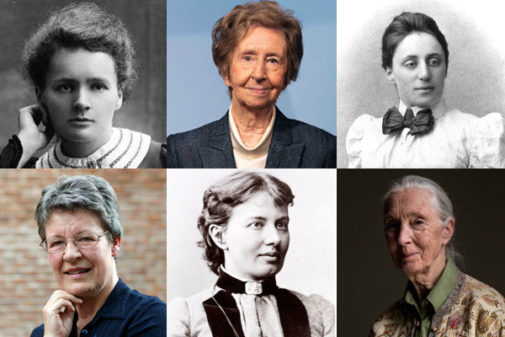- The university population is sinking: what to do when the aules are empty?
Five quinceañeras students from an institute in Móstoles (Madrid) were finalists this year in the Technovation Challenge world championship, a program in which 100 countries participate to reduce the gender technology gap. For four months, the offspring developed an app with geolocation that helps girls who are attacked on the street.
This initiative is cited by the computer engineer specialized in artificial intelligence Nerea Luis as an example of the measures that do work to promote female vocations in the STEM areas (Science, Technology, Engineering and Mathematics). Why? Because, on the one hand, one of the reasons why girls are not interested in these careers is because they see little social utility, and this competition raises projects close to real life. On the other, because the Spanish participants have students from the Carlos III University of Madrid as mentors, leaders who inspire them. All experts agree that mentoring is one of the most effective tools to achieve future accessions and stop defections.
The girls are a minority in the STEM. In Engineering and Architecture, those enrolled represent 25%, according to the Ministry of Education, which warns that, in Computer Science, the percentage of women on public campuses is around 10% . In the investigation this gap is repeated, especially in the category of greater rank (grade A), where, in Engineering and Technology, 7.5% are women compared to 14.5% of men, according to the Scientific report in Figures .
Given this, what can be done? The proposal launched by the PSOE to give girls free enrollment in scientific-health careers has received all kinds of criticism. "We are not silly," Citizens Education spokeswoman Marta Martín said, calling it "patriarchal" and "regressive . " Even in the socialist ranks it has caused rejection, among other things because the same document already proposes to give free tuition to all the university students who approve, be they boys and girls.
What do the experts who work in equality, science and technology think? They believe it will be useless if it is not accompanied by other measures and is part of a global plan. They see it "insufficient" and perhaps "counterproductive."
“It will encourage those behaviors that we complain about, creating an even more hostile environment towards women. They will tell us: 'You have entered for free because you are a girl' or 'Otherwise you would not be here' », says Nerea Luis, founder of the T3chF est on science and technology, Google Women Techmaker award and expert in Talent, Technology and_Gender recognized by the Cotec Foundation.
Nor is the Conference of Rectors of the Spanish Universities (Crue) in favor, which speaks through its Equality delegate, the rector of the Jaume I University of Castellón, Eva Alcón: « With that we are not only going to get anything . Coordinated measures between ministries, autonomous communities, universities and educational centers must be introduced ».
So we will not get anything
Eva Alcón (rector of the Jaume I University of Castellón)Alcón bets on mentoring programs in the early years of the university to avoid abandonment (being a minority in a career multiplies the dropout); promotion of start-ups promoted by women; initiatives to "change the language" in all areas of society; parity in university commissions, and actions dedicated to making good researchers and scientists visible through awards and honors. He also quotes programs such as I want to be an engineer for ESO girls or university fairs where schoolchildren go.
Juan Julián Merelo, Professor of Informatics at the University of Granada who has spent years organizing technology campuses for girls, believes that what works best is to have in the schools solvent teachers who teach Computer Science, Technology and Mathematics in a more attractive way and stuck to reality ».
«Google is financing the training of Primary and Secondary teachers in these areas because it has seen that it is the most effective. Boosting a teaching that has more relationship with society in the end has an indirect gender influence, ”he explains.
He says that the academic elections are taken at around 11 and 12 years old and that is why we must start taking action already from school. Studies show that more or less up to these ages girls have the same interest in Mathematics as boys. Then, towards the age of 15, they begin to get a hobby, for a mixture of family expectations (yes, the parents support the sons more than the daughters to attend engineering); teacher paternalism (teachers rate them with more benevolence, according to the OECD, and that hurts them), and pressure from their environment.
The environmental effect also works. Elena Merelo (21 years old) is proof of that. In his decision to study the double degree of Computer Science and Mathematics, his father, Juan Julián, had to do. «But most of all I was influenced by my Mathematics teacher, who was a reference for me. The teachers of these subjects are usually men and that drives us away. My teacher made me think that if she could, I would be able too.
According to the criteria of The Trust Project
Know more- Education
- science
RESEARCH Can Spanish science survive another crisis?
Meteorology Why (always) it is a bad idea to bomb a hurricane
Space Rolling Stones have their own stone on Mars

